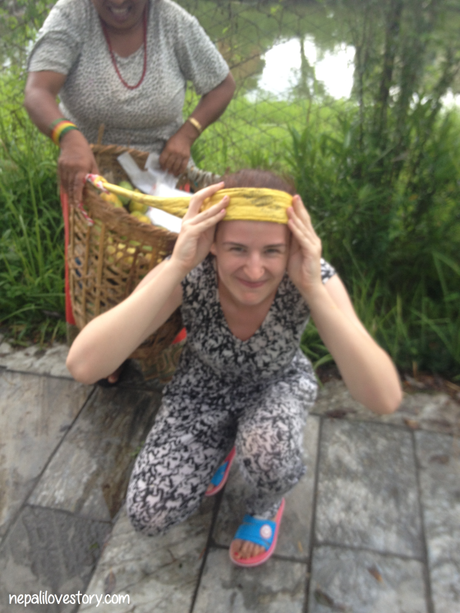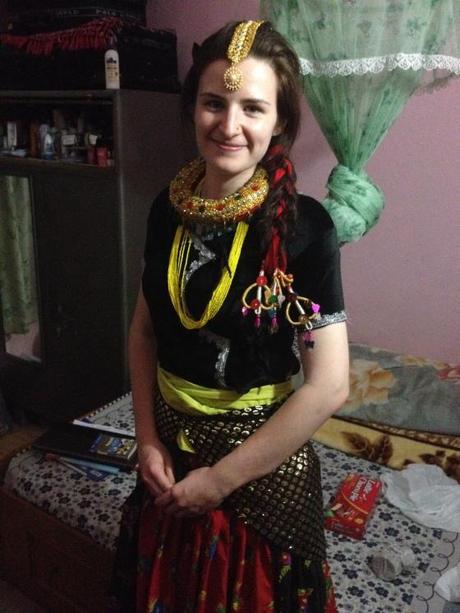My Nepali friend and I were talking about my experience in Nepal when she said that I must have experienced benefits and privilege in for having white skin. After some thought I realised I had not felt a positive discrimination based on the color of my skin and would not say I had experienced a privilege of being a certain color. If anything I found having white skin a hindrance to my life as a Nepali man’s wife.
Don’t get me wrong, I did experience Nepalis telling me that I was beautiful as my skin was so fair. I also had some Indian and Chinese tourists request photos with me. Even when I visited Sri Lanka on a family holiday we had been treated like royalty at times as we were from England/white, so this got me thinking… why not in Nepal? After all, I had seen other white people being treated favorably during my stay.
Partly, the reason is my relationship with Nepal and M. I am M’s girlfriend, his parent’s buhari, his cousin’s bhauju. In Nepal, I wasn’t a tourist or an investor. I wasn’t bringing in money and I wasn’t helping in anyway. I was just living the same life as any other Nepali – but I was white.

Local life: this is FAR heavier than it looked.
Recently, I finished reading the book Land Where I Flee by Prajwal Parajuly. Without getting too much into the story, the boyfriend of a son of a strict Brahmin grandmother turns up at the family home. No one knows that the son is homosexual or that the boyfriend is anything more than a friend. The grandmother allows him to sit at the table and see the festivals – even though he is not ‘Brahmin’ and is white. The grandchildren comment on this and the grandmother replies, that is because “he will never marry one of you”.
I have experienced first-hand where Nepalis have been accommodating to white-skinned volunteers, tourists and workers making a big deal about them, their language, culture and mysterious aura from being from another country. But, the minute someone steps out of these positions and tries to marry into a Nepali household or act like a Nepali then the words are not so kind and gossip increases. Instead of the look of admiration, the white-skinned pseudo Nepali is now greeted with indifference. Although, this isn’t the only outcome on this vast and complex topic, these are examples I can whole-heatedly say I have experienced.
Other reasons I did not experience ‘special treatment’ include my age, gender, ‘caste’ and situation. Many of the expats in Kathmandu were older men and they were treated nicely and with respect due to their high status jobs in NGOs and powerful positions elsewhere. I realized I had entered life in Nepal near the bottom of the rung: a woman, unemployed, no money, not yet graduated, casteless, and a girlfriend who’s not yet married. All these things rolled into one contributed to the context which determined my experience.
Whilst I was in Nepal, M and I got to travel, sight see and do some tourist things. But, as I was with him I did not experience any privileges. Instead, I encountered a Nepali-to-Nepali attitude. My complaints (if any) were greeted with a shrug and a knowing look of “Hey, this is Nepal”. Even at home, I was not exempt from traditions based on my skin colour: I was not able to go into the kitchen when there was rice around and I was confined to being downstairs only when on my period – just two minor examples of my every day life. Elizabeth Enslin wrote about her life married to a Nepali in the book “While the Gods were Sleeping”. At first she thought her status as a Euro-American would trump that of a Brahmin wife before realizing that white people were far lower down the caste hierarchy – “impure but touchable”.

I kept being told I was beautiful because I was ‘fair skinned’. It infuriated me that Nepalis didn’t find there beautiful complexion the same!
I am not denying that in certain places for certain social categories that a privilege has been felt. But, I really enjoyed not having privileges based on the color of my skin as it allowed me to see more of Nepal for what it is, rather than just a fantastic holiday. However, it did sometimes suck amongst the backdrop of the negativity that came along with my white skin e.g. people assuming I was a millionaire and a beef-eater, not being allowed into temples/certain areas, having to pay to wander near the house as it is a ‘tourist area’, having to pay a lot extra than any Nepali for anything etc…. Sometimes when I was in Nepal I wished that I could have taken off my white skin and carried on without out.
I do not agree in privilege based on skin color and I do not agree in discrimination based on skin color. I am still hoping for a time where skin color is not important and is not noticed. But until that day I will have to get used to my life in Nepal as an odd mixture of expectations, attributes, social position and white skin.
Readers – These views are solely my own due to my experiences in Nepal and England. However, I would be really interested in finding out whether others have come across a ‘special treatment’ based on skin color and whether it is affected in any way due to your position?

